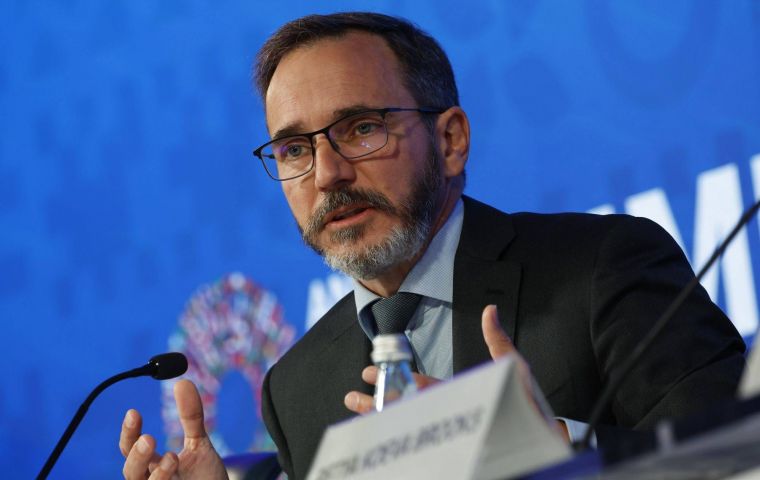MercoPress. South Atlantic News Agency
IMF slightly more optimistic about 2023
 IMF Chief Economist Pierre Olivier Gourinchas explained that in 2023 Argentina will grow by 2%, slightly above the region's average
IMF Chief Economist Pierre Olivier Gourinchas explained that in 2023 Argentina will grow by 2%, slightly above the region's average The International Monetary Fund (IMF) Monday adjusted its projections for 2023 with relatively good news since it upgraded its growth forecast for Latin America by 0.1 percentage points from October's figures. The economy in Latin America and the Caribbean is expected to grow by 1.8% this year amid steady inflation and the worldwide consequences of the armed conflict in Ukraine, the IMF heralded.
In the update of its economic outlook, the International Monetary Fund also forecasted that Brazil's economy will expand by 1.2 % (+0.2 percentage points) and Mexico's 1.7% (+0.5 percentage points over the previous estimate). The two largest Latin American economies will grow more than anticipated three months ago due to “the unexpected resilience of domestic demand and higher-than-expected growth in their main trading partners,” the IMF's report highlighted.
In the case of Brazil, “fiscal support” from the state to the economy also played a role.
Expected growth for the region for 2023 is well below 2022's 3.9% due to the Russian invasion of Ukraine and the ensuing widespread recession and inflation.
For 2024, the Fund forecasts 2.1% growth in the region (-0.3 percentage points above the October forecast), because of “tighter financial conditions, lower prices for exported commodities, and downward revisions to growth in trading partners.”
In the case of Argentina, the global agency recommended the authorities meet the fiscal and monetary targets of the current agreement to “anchor” inflation. The IMF also said Argentina's economy would advance only up to 2% during 2023.
The IMF insisted that it was “very important” that Argentina complied with the fiscal and monetary goals of the agreement, as it understands that this will help stabilize the economy and stop the inflationary escalation.
In addition, the agency estimated that the Argentine economy will have grown by 4.6% in 2022. The projection for last year is higher than the one the organization had foreseen three months ago, but for 2023 it is maintained, as a result of the fiscal and monetary restrictions applied by the Government.
IMF Chief Economist Pierre Olivier Gourinchas explained that in 2023 Argentina will grow by 2% “and we did not make any modification since our previous review in October 2022.”
In Gourinchas' view, this growth percentage -less than half that in 2022- is due to a “combination of two factors: a slowdown in the world economy that will also occur in Argentina and the restrictive policies applied at the fiscal and monetary level to manage high inflation, which last year was close to 100%.”
The Fund also estimated that the world economy will go from growing 3.4% in 2022 to 2.9% in 2023, while Latin America will have grown 3.9% last year and will advance 1.8% this year.
According to the agency, “rising central bank interest rates to combat inflation and Russia's war in Ukraine continue to weigh on economic activity. The rapid spread of Covid-19 in China slowed growth in 2022, but the recent reopening has cleared the way for a faster-than-anticipated recovery.”
”Global inflation is projected to decline from 8.8% in 2022 to 6.6% in 2023 and 4.3% in 2024, still higher than the levels seen before the pandemic (2017-19) of around 3.5%,” the global economic projections report added.




Top Comments
Disclaimer & comment rulesCommenting for this story is now closed.
If you have a Facebook account, become a fan and comment on our Facebook Page!